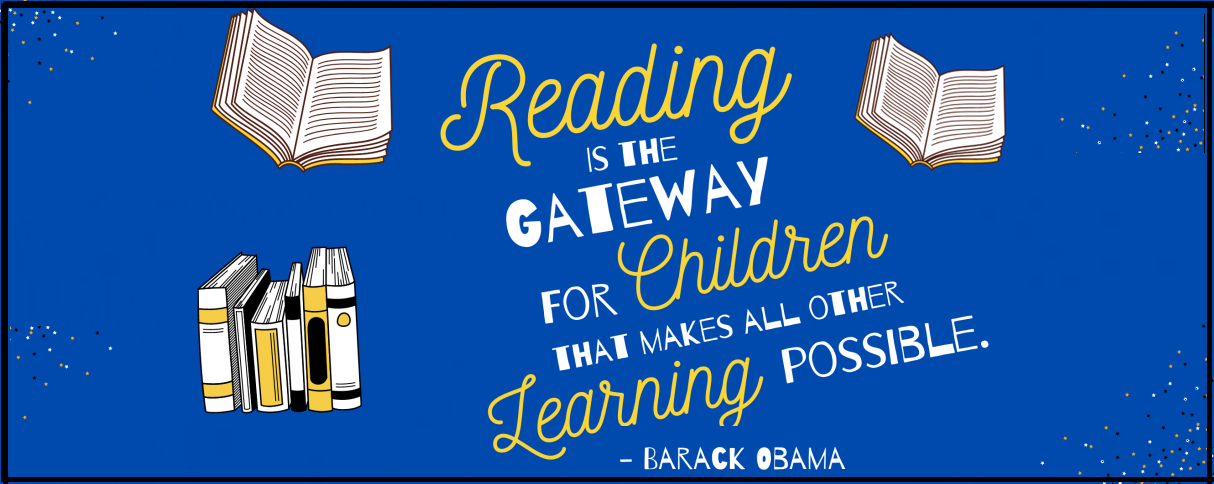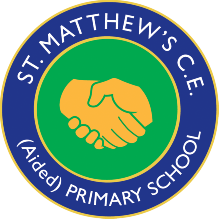
"There is more treasure in books than in all the pirate's loot on Treasure Island"
Walt Disney (1818-1890)
Our Vision for Reading
At St Matthew’s Primary school, our school vision is to encourage all children to flourish spiritually, morally, emotionally, physically and intellectually in all aspects of life demonstrating perseverance and resilience; this is emulated across all curriculum areas.
Intent
We know that reading is a fundamental life skill and here at St Matthew’s we are committed to support our pupils to become lifelong readers. We dedicate our time to motivate children to ‘first learn to read’ and then inspire them to ‘next read to learn.’ Reading lays the foundations for success in future areas of study and employment as well as supporting cultural, emotional, intellectual, social and spiritual development.
Our curriculum intent enables pupils both to acquire knowledge and build upon what they already know by developing their prior understanding. Language skills develop children’s learning across the wider curriculum and are essential to equip pupils to participate as tolerant and capable members of society.
At St Matthew's we:
- Have high expectations of all children, and encourage pupils to challenge themselves, persevere and strive to reach their full potential because “I can do all things because Christ gives me strength and with God all things are possible.”
- Drive and encourage a love of reading, enriching children's education through engaging teaching activities.
- Utilise imaginative stories and thought-provoking texts to inspire and motivate pupils as authors of the future.
- Enable pupils both to acquire knowledge and build upon what they already know by developing their prior understanding. Language skills develop children’s learning across the wider curriculum and are essential to equip pupils to participate as tolerant and capable members of society.
- Prioritise a rich reading environment and library that promotes reading for meaning, purpose and pleasure.
- Ensure that children become independent readers who choose to read for many different purposes throughout their lives.
- Have a quiet reflection/reading area for children to utilise and encourage quiet time to develop their love of reading and get ‘hooked on books.’
- Strive to foster a love of reading as we believe it is an entitlement that should enable children to connect with some of the finest words ever written.
- Endeavour to open up a world of possibility and intrigue encouraging children to communicate effectively in all areas and equip them for the challenges they will face in the wider world.
- Prioritise speaking and listening is n order to build vocabulary and develop independent and reflective readers who can read fluently and for meaning.
- Provide rich, meaningful discussions around texts, where all children feel confident and able to contribute by using their reading skills to access all areas of learning.
Implementation
All learning starts by revisiting the children’s prior knowledge. This is scaffolded to support children to recall previous learning and make new meaningful connections in their long-term memory. To ensure that pupils develop a secure knowledge that can be built upon and embedded, our curriculum is organised using a progressive model that identifies the expectations for each year group including fluency, comprehension, comparing and contrasting vocabulary, inference, prediction and speaking and listening.
When teaching reading, lesson content is carefully planned to challenge pupils. Staff formatively assess and explicitly model the correct subject-specific vocabulary, knowledge, and skills relevant to the learning to ensure new knowledge can be integrated into larger concepts and retained in the long-term memory.
We use a synthetic phonics programme called Read, Write Inc and deliver phonics sessions every morning. Phonics lessons follow the method of learning letter sounds and blending them together to read and write words. This is supported by a comprehensive scheme of reading books for key stage 1 children (Read, Write Inc book bag books) that builds on the children’s knowledge from the phonics sessions working through the phases either individually or in small group sessions. This continues into Key Stage 2 as necessary. Children who are ‘catching up’ are encouraged to take home a new phonics reading book after each session. Where children do not read at home, staff facilitate extra reading sessions during the school day.
Stories, poems, rhymes, and non-fiction are chosen to develop pupils’ vocabulary, language comprehension and a love of reading. Pupils are familiar with and enjoy listening to a wide range of stories, poems, rhymes and non-fiction.
Pupils are read to every day and aspirational class texts are identified and studied in each class. Reading across the curriculum texts are also being identified and developed.
Whole class reading is utilised to develop a love of reading, broaden vocabulary and improve language comprehension. Teachers are clear regarding the purpose of their whole class reading lessons and encourage incidental reading opportunities throughout the school day and across a range of subjects. These include 1:1 reading for pupils who require additional support developing fluency, accuracy, speed and automaticity.
In accordance with our commitment to deliver reading programs based on instructional strategies, we teach the five main components of reading identified by the National Reading Panel. These include phonemic awareness, phonics, fluency, vocabulary, and comprehension. These reading domains prioritise fostering a love of reading, expand vocabulary and improve language and comprehension.
Story time takes place in all classes and supports reading for pleasure and familiarisation with a range of carefully selected aspirational texts.
Our impressive library and reading areas provide opportunities for pupils to taker greater ownership of their own reading and develops pupils’ knowledge of a range of different authors and genres. This is augmented further by providing children with:
- Reading journals to document their reading journey.
- Pupil reading ambassadors to encourage pupil voice.
- Opportunities to bring reading to life and give it purpose using music, drama and performance.
- Reading events and workshops: World Book Day, Pyjamarama, Book bus, library and author visits.
Impact
Through the teaching of systematic phonics, our aim is for children to become fluent and confident readers in Key Stage 1. Prioritising decoding, pupils will become familiar with this strategy and have the confidence to work out unfamiliar words in new texts they encounter when they reach the end of the RWI programme. Pupils have the opportunity to develop both their fluency and comprehension as they continue their reading journey through the school.
We believe that reading is the key to unlock all learning and so the impact of our reading extends beyond statutory assessments. We see reading as the golden thread running through a child’s journey at St Matthew’s. When they leave us, we want pupils to possess a love of literature which provides them with the knowledge, skills and enjoyment to access any future learning and development.
We measure attainment in reading and the impact of our curriculum through the following methods:
- Assessments at the end of EYFS, Key Stage 1 and 2 and following the outcomes in the Year 1 Phonics Screening check.
- Triangulating reading attainment and progress data through the use of RWI half termly phonics screening assessments, NTS (Boost Insights) reading papers as well as ongoing teacher assessment.
- Teacher assessment used to identify gaps in learning to plan and adapt subsequent lessons.
- Specific knowledge, skills and vocabulary for each year group outlined in our reading progression grids.
- Well sequenced lessons and targeted interventions that build on prior knowledge, consolidation and support effective teacher modelling.
- Pupil discussions and interviewing the pupils about their learning (pupil voice).
- Governor monitoring with our subject music link governor.
- Annual reporting and tracking of standards across the curriculum.
- Use of the assessment tools provided within our Boost Insights and RWI assessment trackers.
- Dedicated subject leader time.
We strive for our pupils to have a love of reading and be able to read confidently to gain new knowledge across the curriculum and in the wider world.
We aim for our pupils to have a sound knowledge of genres and authors enabling them to make informed choices when selecting books. This approach supports reading fluently, accurately, stamina, and enhanced cultural capital.
St Matthew's progression of knowledge and skills
Children at St Matthew's can access a range of E-books by logging onto our Reading platform Oxford Owl. See below:
 |
| Click on image above |
